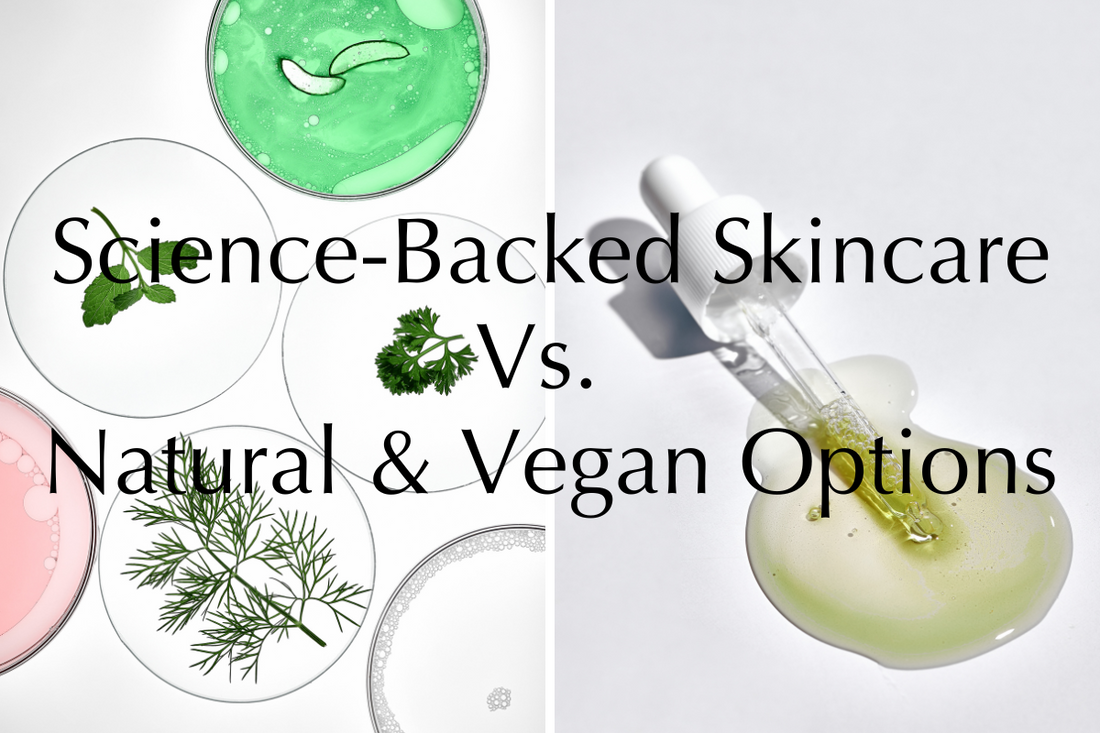
Why Science-Based Skincare Is More Effective Than Natural or Vegan Products
Share
Discover why science-backed skincare products are more effective than natural or vegan alternatives. Clinically proven ingredients yield better and consistent results.
Introduction
In the world of skincare, consumers are increasingly faced with a choice: should they opt for science-backed skincare products or rely on the allure of natural and vegan skincare? While natural skincare has its appeal, it often lacks the clinical results many people expect. On the other hand, science-backed formulations are supported by research and proven to deliver effective, targeted results. Here’s why science-based skincare outperforms its natural counterparts.
1. Ingredient Efficacy: Clinically Proven vs. Natural Alternatives
Science-backed skincare is built around active ingredients that have undergone rigorous clinical trials. These ingredients, like retinoids, peptides, AHAs, and BHAs, are designed to target specific skin concerns such as acne, aging, and pigmentation. These ingredients are proven to work because their efficacy is well-documented.
For instance, retinoids, which are derivatives of Vitamin A, have been shown to reduce wrinkles, stimulate collagen, and improve skin texture. Compare that to a popular natural alternative like rosehip oil, which, while nourishing, doesn’t offer the same anti-aging benefits as retinoids do.
2. Stability and Shelf Life: Why Science Formulations Last Longer
One of the biggest advantages of science-backed skincare is stability. Ingredients like Vitamin C and niacinamide are notoriously unstable, yet science ensures these ingredients are formulated to last. This involves protecting them from oxidation and degrading, often through the use of air-tight, opaque packaging and stabilizing agents.
Natural skincare products, on the other hand, often contain essential oils and butters that oxidize over time, losing their potency. The absence of synthetic preservatives in natural products means they have a shorter shelf life and may not deliver consistent results.
Science-backed skincare brands use advanced technologies, like encapsulation, to ensure that active ingredients remain potent until they’re applied to the skin.
3. Targeted Treatments for Skin Concerns: Precision Over Generalization
If you’re dealing with specific skin issues—be it acne, wrinkles, or dark spots—you’re more likely to find solutions with science-backed skincare products. These formulations are designed to target problems at their root. Take salicylic acid, for example, a scientifically backed ingredient that penetrates deep into the skin to unclog pores and reduce acne. This precision makes it far more effective than natural alternatives like tea tree oil, which may help but lacks the targeted action of salicylic acid.
Similarly, hyaluronic acid, a science-backed humectant, hydrates your skin on a deeper level than natural moisturizers like aloe vera. Natural products, while soothing, don’t offer the specificity and efficacy of scientifically formulated ingredients.
4. Consistency of Results: Standardization in Formulation
One of the greatest advantages of science-backed skincare is its reliability. Each bottle of a scientifically formulated product contains the same concentration of active ingredients, ensuring that results are consistent. Whether you’re using a retinol serum or a niacinamide moisturizer, you can trust that the potency will remain the same each time you apply it.
Natural products, however, are more variable. The potency of plant-based ingredients can change depending on harvest time, soil conditions, and formulation methods, making it harder to achieve consistent results.
In addition, science-backed skincare brands often use delivery systems like liposomes to ensure that active ingredients penetrate deep into the skin for maximum effect.
5. Safety and Allergen Control: The Myth of “Natural Is Safer”
There’s a common misconception that natural skincare is always safer, but that’s not necessarily true. Many natural ingredients, such as essential oils, can cause irritation or allergic reactions. For example, ingredients like lavender oil or citrus extracts, while marketed as gentle, can lead to sensitivities or allergic reactions, especially when exposed to sunlight.
In contrast, science-backed skincare products undergo rigorous testing to minimize the risk of irritation and allergies. Ingredients are carefully refined to ensure their safety and effectiveness. For example, synthetic ceramides mimic the skin’s natural barrier and are much less likely to cause irritation than their plant-based counterparts.
When it comes to skincare, “natural” doesn’t always mean safer. Science-backed formulations are designed not only for efficacy but also to minimize the risk of allergic reactions.
Introduction
In the world of skincare, consumers are increasingly faced with a choice: should they opt for science-backed skincare products or rely on the allure of natural and vegan skincare? While natural skincare has its appeal, it often lacks the clinical results many people expect. On the other hand, science-backed formulations are supported by research and proven to deliver effective, targeted results. Here’s why science-based skincare outperforms its natural counterparts.
1. Ingredient Efficacy: Clinically Proven vs. Natural Alternatives
Science-backed skincare is built around active ingredients that have undergone rigorous clinical trials. These ingredients, like retinoids, peptides, AHAs, and BHAs, are designed to target specific skin concerns such as acne, aging, and pigmentation. These ingredients are proven to work because their efficacy is well-documented.
For instance, retinoids, which are derivatives of Vitamin A, have been shown to reduce wrinkles, stimulate collagen, and improve skin texture. Compare that to a popular natural alternative like rosehip oil, which, while nourishing, doesn’t offer the same anti-aging benefits as retinoids do.
2. Stability and Shelf Life: Why Science Formulations Last Longer
One of the biggest advantages of science-backed skincare is stability. Ingredients like Vitamin C and niacinamide are notoriously unstable, yet science ensures these ingredients are formulated to last. This involves protecting them from oxidation and degrading, often through the use of air-tight, opaque packaging and stabilizing agents.
Natural skincare products, on the other hand, often contain essential oils and butters that oxidize over time, losing their potency. The absence of synthetic preservatives in natural products means they have a shorter shelf life and may not deliver consistent results.
Science-backed skincare brands use advanced technologies, like encapsulation, to ensure that active ingredients remain potent until they’re applied to the skin.
3. Targeted Treatments for Skin Concerns: Precision Over Generalization
If you’re dealing with specific skin issues—be it acne, wrinkles, or dark spots—you’re more likely to find solutions with science-backed skincare products. These formulations are designed to target problems at their root. Take salicylic acid, for example, a scientifically backed ingredient that penetrates deep into the skin to unclog pores and reduce acne. This precision makes it far more effective than natural alternatives like tea tree oil, which may help but lacks the targeted action of salicylic acid.
Similarly, hyaluronic acid, a science-backed humectant, hydrates your skin on a deeper level than natural moisturizers like aloe vera. Natural products, while soothing, don’t offer the specificity and efficacy of scientifically formulated ingredients.
4. Consistency of Results: Standardization in Formulation
One of the greatest advantages of science-backed skincare is its reliability. Each bottle of a scientifically formulated product contains the same concentration of active ingredients, ensuring that results are consistent. Whether you’re using a retinol serum or a niacinamide moisturizer, you can trust that the potency will remain the same each time you apply it.
Natural products, however, are more variable. The potency of plant-based ingredients can change depending on harvest time, soil conditions, and formulation methods, making it harder to achieve consistent results.
In addition, science-backed skincare brands often use delivery systems like liposomes to ensure that active ingredients penetrate deep into the skin for maximum effect.
5. Safety and Allergen Control: The Myth of “Natural Is Safer”
There’s a common misconception that natural skincare is always safer, but that’s not necessarily true. Many natural ingredients, such as essential oils, can cause irritation or allergic reactions. For example, ingredients like lavender oil or citrus extracts, while marketed as gentle, can lead to sensitivities or allergic reactions, especially when exposed to sunlight.
In contrast, science-backed skincare products undergo rigorous testing to minimize the risk of irritation and allergies. Ingredients are carefully refined to ensure their safety and effectiveness. For example, synthetic ceramides mimic the skin’s natural barrier and are much less likely to cause irritation than their plant-based counterparts.
When it comes to skincare, “natural” doesn’t always mean safer. Science-backed formulations are designed not only for efficacy but also to minimize the risk of allergic reactions.
